The Middle East's investments in Africa hold the key to unlocking the continent's economic resurgence, as they address critical economic and infrastructure needs and offer new avenues for collaboration, particularly in sub-Saharan Africa, where Chinese investments have decreased. The GCC's interest in Africa's growth is fueled by robust GDP figures and an abundance of available capital, creating opportunities for partnerships in sectors such as infrastructure, telecoms, and food security. However, challenges such as the infrastructure deficit and political uncertainties need to be addressed to sustain this partnership.
China has promised extensive cooperation in the energy sector with South Africa and advised streamlining tender processes and relaxing BEE policies to make cooperation easier, according to Chinese officials at the BRICS summit in Johannesburg.
South Africa is poised to expand its agricultural trade and globalize its economy as it enhances its position within the BRICS grouping, with the ZZ2 Farming Company using cutting edge technologies and tariff agreements to facilitate agricultural trade with other BRICS countries; the expansion of BRICS will create a powerful group of growth economies that will demand multilateral reforms, increase collaboration among growth economies, and enhance the use of regional currencies.
Africa's potential for economic growth is hindered by macroeconomic factors and a struggling mining sector, but the continent's large population and rich resources offer opportunities for transformation and development; countries with higher exports, such as Cameroon, Ethiopia, Zambia, Tanzania, and Kenya, are among the most respected countries in Africa.
U.S. President Joe Biden plans to offer financial support to developing countries in Africa, Latin America, and Asia as an alternative to China's Belt and Road project, taking advantage of Chinese President Xi Jinping's absence at the G20 meeting and China's economic downturn.
